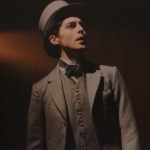 A new Matthew Bourne production always has the promise of greatness. It was at the Wycombe Swan that we first saw his Adventures in Motion Pictures’ Swan Lake, one Saturday matinee in 1995, and we were electrified by it. I think we saw it three or four times within that first year, and whenever it comes round, as it often does, it’s our sworn duty to go and see it again. Since then we’ve seen Cinderella, Nutcracker, Highland Fling, The Car Man, Play Without Words, Dorian Gray, and last year’s Early Adventures, all of which are somewhere on the scale between very good and excellent. And now we have Sleeping Beauty, which to my mind is the nearest he has come to recreating the theatrical thrill that is his Swan Lake.
A new Matthew Bourne production always has the promise of greatness. It was at the Wycombe Swan that we first saw his Adventures in Motion Pictures’ Swan Lake, one Saturday matinee in 1995, and we were electrified by it. I think we saw it three or four times within that first year, and whenever it comes round, as it often does, it’s our sworn duty to go and see it again. Since then we’ve seen Cinderella, Nutcracker, Highland Fling, The Car Man, Play Without Words, Dorian Gray, and last year’s Early Adventures, all of which are somewhere on the scale between very good and excellent. And now we have Sleeping Beauty, which to my mind is the nearest he has come to recreating the theatrical thrill that is his Swan Lake.
 Good to see Mr Bourne is still working with his tried and tested colleagues. One glance at the programme and you are reassured to see that Lez Brotherston has designed the set and costumes. The sets are amazing – opulent and classy, and still leaving a large central space for all the dancing to take place. Particularly stunning are the house and garden scene for Act Two and the neon lit wedding reception for Act Four. The costumes are splendid too – especially outstanding are those for the good fairies and Carabosse. The puppetry to convey the baby Aurora is also brilliant: subtly done, remarkably realistic and very funny.
Good to see Mr Bourne is still working with his tried and tested colleagues. One glance at the programme and you are reassured to see that Lez Brotherston has designed the set and costumes. The sets are amazing – opulent and classy, and still leaving a large central space for all the dancing to take place. Particularly stunning are the house and garden scene for Act Two and the neon lit wedding reception for Act Four. The costumes are splendid too – especially outstanding are those for the good fairies and Carabosse. The puppetry to convey the baby Aurora is also brilliant: subtly done, remarkably realistic and very funny.
 One of the problems I have with some of Mr Bourne’s works is that, for contemporary dance productions, sometimes they’re just isn’t enough choreography. Well he’s certainly put that right with Sleeping Beauty. It’s jam-packed full of dance; and one of the finest sequences comes quite early on with a remarkable pas de six performed by Count Lilac and the five fairies. Lively, exciting, dramatic and also humorous, the variations are all superbly danced and you can’t help but grin from ear to ear whilst watching.
One of the problems I have with some of Mr Bourne’s works is that, for contemporary dance productions, sometimes they’re just isn’t enough choreography. Well he’s certainly put that right with Sleeping Beauty. It’s jam-packed full of dance; and one of the finest sequences comes quite early on with a remarkable pas de six performed by Count Lilac and the five fairies. Lively, exciting, dramatic and also humorous, the variations are all superbly danced and you can’t help but grin from ear to ear whilst watching.
 A very small quibble – it’s hard to tell from the programme who is performing which role as you have a choice of two or three performers for each character and no information insert to guide you for that individual performance. So in my mentions of any particular dancers in this blog, I sincerely hope I have allocated the correct dancer to the correct role – I am relying on their bio photos and my mental images of what they looked like! I’m pretty sure our Count Lilac was Christopher Marney, recently a well deserved nomination for outstanding performance in Modern Dance in the National Dance Awards. He was excellent in this Act One pas de six, but also fantastic in the climactic assault on the wicked Caradoc at the end, even if his masked appearance with Leo (Chris Trenfield at our performance) making their way to the wedding reception, did put me slightly in mind of the 1960s Batman and Robin. I was also a little put off by the visual tableau just before the interval when it looked like we’d gone all Transylvanian. Mr Marney looked highly creepy in this scene, and I thought Leo’s transformation into a good fairy could have been done a little more subtly.
A very small quibble – it’s hard to tell from the programme who is performing which role as you have a choice of two or three performers for each character and no information insert to guide you for that individual performance. So in my mentions of any particular dancers in this blog, I sincerely hope I have allocated the correct dancer to the correct role – I am relying on their bio photos and my mental images of what they looked like! I’m pretty sure our Count Lilac was Christopher Marney, recently a well deserved nomination for outstanding performance in Modern Dance in the National Dance Awards. He was excellent in this Act One pas de six, but also fantastic in the climactic assault on the wicked Caradoc at the end, even if his masked appearance with Leo (Chris Trenfield at our performance) making their way to the wedding reception, did put me slightly in mind of the 1960s Batman and Robin. I was also a little put off by the visual tableau just before the interval when it looked like we’d gone all Transylvanian. Mr Marney looked highly creepy in this scene, and I thought Leo’s transformation into a good fairy could have been done a little more subtly.
 Chris Trenfield is great as Leo – he does some wonderful solos and has a fantastic rapport with Hannah Vassallo who played Aurora when we saw it. His highly athletic dancing, dressed as a working gamekeeper whilst everyone else is in their fancy garden party whites, is visually outstanding and Mr Trenfield really gets into the rough-and-ready aspect of the character. The only duff note of the whole evening for us was the step sequence depicting Leo going on an interminably long walk to find Aurora.
Chris Trenfield is great as Leo – he does some wonderful solos and has a fantastic rapport with Hannah Vassallo who played Aurora when we saw it. His highly athletic dancing, dressed as a working gamekeeper whilst everyone else is in their fancy garden party whites, is visually outstanding and Mr Trenfield really gets into the rough-and-ready aspect of the character. The only duff note of the whole evening for us was the step sequence depicting Leo going on an interminably long walk to find Aurora. It was funny at first, but then it just went on too long – and choreographically, it’s not very interesting. Miss Vassallo was a superb Aurora; cheeky, slightly tomboyish when we first see her; amusingly checking out all the suitors at the garden party, and her dancing with Leo in that scene was exquisite. She looks perfect for the role too – precisely how one would imagine Sleeping Beauty to look in real life.
It was funny at first, but then it just went on too long – and choreographically, it’s not very interesting. Miss Vassallo was a superb Aurora; cheeky, slightly tomboyish when we first see her; amusingly checking out all the suitors at the garden party, and her dancing with Leo in that scene was exquisite. She looks perfect for the role too – precisely how one would imagine Sleeping Beauty to look in real life.
 Casting a severe spell over the garden party scene is Caradoc, the nasty son of the dark fairy Carabosse, both played by Ben Bunce (I think) in the production we saw. His appearance as Carabosse in the first scene is thrilling. He looks like the most malicious drag queen diva bullying his demands on the ineffectual King and Queen, almost as if he were a Beardsley creation (Aubrey, not Peter).
Casting a severe spell over the garden party scene is Caradoc, the nasty son of the dark fairy Carabosse, both played by Ben Bunce (I think) in the production we saw. His appearance as Carabosse in the first scene is thrilling. He looks like the most malicious drag queen diva bullying his demands on the ineffectual King and Queen, almost as if he were a Beardsley creation (Aubrey, not Peter).  Mrs Chrisparkle wasn’t over-menaced by Carabosse’s two attendants though; more wet than threat, she felt. As the dark fairy’s son Caradoc, Mr Bunce is the height of snooty, manipulative villainy and his scenes with Aurora are mesmerising; you’d swear Rohypnol was involved. There’s a wonderful coup de theatre – 100% Bourne – when Leo goes to wake Aurora in her bed… and it isn’t her. Caradoc’s final come-uppance is a thrilling scene, with great visual impact and energetic choreography, not to mention effective use of stage tattoos.
Mrs Chrisparkle wasn’t over-menaced by Carabosse’s two attendants though; more wet than threat, she felt. As the dark fairy’s son Caradoc, Mr Bunce is the height of snooty, manipulative villainy and his scenes with Aurora are mesmerising; you’d swear Rohypnol was involved. There’s a wonderful coup de theatre – 100% Bourne – when Leo goes to wake Aurora in her bed… and it isn’t her. Caradoc’s final come-uppance is a thrilling scene, with great visual impact and energetic choreography, not to mention effective use of stage tattoos.
 The whole ensemble are on top form, with great support from Luke Murphy as the footman and Katy Lowenhoff as the nanny, Daniel Collins and Danny Reubens amongst the suitors and Kate Lyons and Mari Kamata amongst the fairies. Apologies if I have some of the casting wrong – but without a detailed cast list the programme is almost worthless!
The whole ensemble are on top form, with great support from Luke Murphy as the footman and Katy Lowenhoff as the nanny, Daniel Collins and Danny Reubens amongst the suitors and Kate Lyons and Mari Kamata amongst the fairies. Apologies if I have some of the casting wrong – but without a detailed cast list the programme is almost worthless!
 This is a very fine addition to the Bourne canon; and whilst it has neither the painful emotional drive of Swan Lake nor its extraordinarily varied and satisfying score, it’s a delight to see that Mr Bourne is still producing dance productions of the highest quality and vigour. It’s already had a sell-out season at Sadler’s Wells; it was a completely full house when we saw it – wonderful for a Wednesday night in Milton Keynes – and it will continue to tour. I see no reason why this shouldn’t follow Swan Lake and have a proper West End Theatre run. We would be very happy to see it again.
This is a very fine addition to the Bourne canon; and whilst it has neither the painful emotional drive of Swan Lake nor its extraordinarily varied and satisfying score, it’s a delight to see that Mr Bourne is still producing dance productions of the highest quality and vigour. It’s already had a sell-out season at Sadler’s Wells; it was a completely full house when we saw it – wonderful for a Wednesday night in Milton Keynes – and it will continue to tour. I see no reason why this shouldn’t follow Swan Lake and have a proper West End Theatre run. We would be very happy to see it again.
 PS. The Milton Keynes Theatre experience is definitely on the ascendant. Not only have they opened up the area of the foyer which used to be a supporters/club members/rich people only area, and now which provides much more space for everyone to relax pre-show, they’ve now also got a chap tinkling the ivories, and I must say he was jolly good. A really jazzy funky version of Justin Timberlake’s Cry Me A River sent us into the theatre with a spring in our step and having forgotten the cares and woes of the day. Well done!
PS. The Milton Keynes Theatre experience is definitely on the ascendant. Not only have they opened up the area of the foyer which used to be a supporters/club members/rich people only area, and now which provides much more space for everyone to relax pre-show, they’ve now also got a chap tinkling the ivories, and I must say he was jolly good. A really jazzy funky version of Justin Timberlake’s Cry Me A River sent us into the theatre with a spring in our step and having forgotten the cares and woes of the day. Well done!
































































